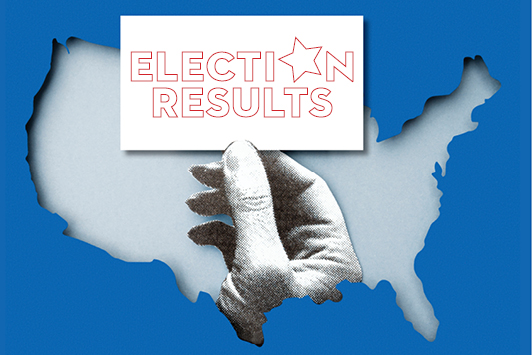
Presidential elections usually precede policy changes. However, this year’s incoming US officials face unprecedented circumstances and are poised to make sweeping, even historic shifts. During his first month in office, President Joe Biden signed a record-breaking 24 executive orders, according to the Federal Register, overturning significant swaths of the previous administration’s work. And the Biden-Harris government is just getting started. What will these changes mean for the jewelry industry?
Pandemic relief
One of the first tasks of the new administration will be tackling the coronavirus. “The Biden administration will spend trillions of dollars to help solve Covid-19 and to keep the economy growing,” assesses Marty Hurwitz, cofounder and CEO of consulting firm MVI Marketing, which specializes in the jewelry industry.
For better or for worse, the pandemic was a net positive for many jewelers, he contends. “Jewelry has a certain emotional appeal as a purchase, and during Covid-19, people needed a bond with their loved ones. Jewelry really filled that need, so Covid-19 has been a boon to the jewelry industry, ironically enough.”
Although some worry “that as Covid-19 wanes, it will negatively impact jewelry spending,” he says, he believes this concern is unfounded. “It’s not happening in the near term. And anyway, the amount of money the administration will be pumping into the economy will help everyone.”
Even so, the virus has affected not just what consumers buy, but how they shop.
“The outlook in 2021 for retail, luxury retail and luxury jewelry remains tied to Covid-19, and how soon the US and the world get vaccines and win the Covid-19 war,” says Marie Driscoll, managing director of luxury and fashion at Coresight Research. “Consumer migration to online shopping, [in] multiple categories, continues with [or] without Covid-19, which accelerated the migration. When consumers feel safe being social [again], we expect pent-up demand to drive visits to stores, vacation destinations and restaurants.”
This could benefit brick-and-mortar stores that have languished during lockdown, suggests Driscoll, whose firm focuses on retail and technology. She predicts that “the trend for experiences over product, [which] was sidelined with Covid-19, will see a rebound.”
Focus on sustainability
Climate change, sustainability, and eco-friendly materials and practices will also take center stage as the administration draws greater attention to environmental, social and governance (ESG) concerns. ESG is “a significant issue for the diamond, jewelry and watch world that I think will be enhanced by the Biden administration,” says Hurwitz. “Not only did they appoint [former Secretary of State] John Kerry as a climate czar, but they gave [geneticist] Eric Lander a cabinet position as science advisor. This is historic, especially coming off of the Trump administration, where science was ignored.”
New environmental policies may also impact consumer behavior. “The Biden focus on climate change increases consumer awareness of environmental sustainability,” says Driscoll. “Retailers and brands that aren’t executing sustainable practices [risk] alienating the increasing number of consumers and employees that value sustainability and factor [it into their purchasing choices].”
Many luxury brands have already been working to mitigate their environmental footprints, observes Greg Furman, founder and chairman of the Luxury Marketing Council. “Most of the brands that need to think about that have thought about it,” he says. “And the ones that haven’t? Woe to them. Anyone who is asleep at the switch on social and environmental issues is a dinosaur.”
Economic support
New economic aid packages are also on the horizon, and they can’t come too soon for many businesses and workers.
“The jewelry sector, similar to retail, is fragmented,” says Driscoll — though she adds that there’s been some consolidation since Covid-19 forced some nonessential businesses to close permanently. “Laying the foundation for a strong economic recovery includes addressing the entrepreneur and small and mid-size enterprises (SMEs). Relief and aid to small businesses will go a long way toward reviving the US growth engine, [and] government support of made-in-America products should benefit local artisans and US-based brands.”
Biden’s push to raise the minimum wage will also affect stores, though Driscoll believes the benefits will outweigh any drawbacks. “For retail generally, higher minimum wages, holding everything else constant, will impact profits,” she says. “However, for workers earning minimum wage, and [those] whose wages are tied to minimum wage, increased disposable income will result, which could work its way into retail.” That said, higher tax brackets may feel more of a pinch, she cautions. “Changes that are planned for corporate and personal taxes could have an impact on disposable income, and consequently retail.”
Furman expects the luxury sector to stay largely immune to upheavals. In the 28 years he’s been in luxury marketing, he says, he’s found that “irrespective of up markets and down markets — I don’t want to sound arrogant, but the rich are always going to be rich. Not to be cavalier, but the luxury buyer will always buy luxury unless there’s global devastation far beyond Covid-19.”
Greater diversity
Diversity issues are also expected to become a focus.
“The jewelry industry, like the Biden administration, needs to look like America,” stresses Hurwitz. “It needs to look more like the general population...in terms of ethnicity and sexual orientation, with more women. The jewelry industry is way behind the Biden administration in that. So everyone needs to aggressively recruit that personnel.”
To be effective, the changes will need to be substantive, he says. “We’re in an industry dominated by old, fat, white men, many of whom may have been Trump supporters. And younger consumers can smell bullshit a mile away. If a brand pushes [empty talk] instead of a real initiative, they’re going to be called out.”
Article from the Rapaport Magazine - March 2021. To subscribe click here.